Understanding the Costs of Inaction–An Assessment of Pluvial Flood Damages in Two European Cities
Abstract
1. Introduction
1.1. Direct Damage Assessments
1.1.1. Hazard Analysis
1.1.2. Exposure Analysis
1.1.3. Vulnerability Analysis
1.2. Objective of This Research
2. Materials and Methods
2.1. Study Areas
2.2. Flood Modelling with 3Di
2.3. Damage Assessment with WSS
3. Results
3.1. Direct Flood Damage in Belgrave
3.2. Direct Flood Damage in Lombardijen
4. Discussion
4.1. Data Limitations
4.2. Looking Towards the Future
5. Conclusions
Author Contributions
Funding
Acknowledgments
Conflicts of Interest
References
- Kummu, M.; De Moel, H.; Ward, P.J.; Varis, O. How close do we live to water? A global analysis of population distance to freshwater bodies. PLoS ONE 2011, 6, e20578. [Google Scholar] [CrossRef] [PubMed]
- CRED. Cred Crunch 50: Natural Disasters in 2017—Lower mortality, Higher Cost. Available online: http://www.emdat.be/publications (accessed on 20 October 2018).
- European Environment Agency. Flood Risks and Environmental Vulnerability: Exploring the Synergies between Floodplain Restoration, Water Policies and Thematic Policies; European Environment Agency, Publications Office of the European Union: Luxembourg, Luxembourg, 2016; ISBN 978-92-9213-716-8. [Google Scholar]
- World Economic Forum. The Global Risks Report 2018, 13th ed.; World Economic Forum: Geneva, Switzerland, 2018; ISBN 978-1-944835-15-6. [Google Scholar]
- Olesen, L.; Lowe, R.; Arnbjerg-Nielsen, K. Flood Damage Assessment: Literature Review and Recommended Procedure; Cooperative Research Centre for Water Sensitive Cities: Melbourne, Australia, 2017; ISBN 978-1-921912-39-9. [Google Scholar]
- Szewranski, S.; Chruscinski, J.; Kazak, J.; Swiader, M.; Tokarczyk-Dorociak, K.; Zmuda, R. Pluvial Flood Risk Assessment Tool (PFRA) for Rainwater Management and Adaptation to Climate Change in Newly Urbanised Areas. Water 2018, 10, 386. [Google Scholar] [CrossRef]
- Zhou, Q.; Mikkelsen, P.S.; Halsnæs, K.; Arnbjerg-Nielsen, K. Framework for economic pluvial flood risk assessment considering climate change effects and adaptation benefits. J. Hydrol. 2012, 414, 539–549. [Google Scholar] [CrossRef]
- City of Copenhagen. Cloudburst Management Plan 2012; The City of Copenhagen Technical and Environmental Administration: Copenhagen, Denmark, 2012. [Google Scholar]
- European Environment Agency. Climate Change: The Cost of Inaction and the Cost of Adaptation; European Environment Agency, Publications Office of the European Union: Luxembourg, Luxembourg, 2007; ISBN 978-92-9167-974-4. [Google Scholar]
- Hammond, M.J.; Chen, A.S.; Djordjević, S.; Butler, D.; Mark, O. Urban flood impact assessment: A state-of-the-art review. Urban Water J. 2015, 12, 14–29. [Google Scholar] [CrossRef]
- De Moel, H.; Jongman, B.; Kreibich, H.; Merz, B.; Penning-Rowsell, E.; Ward, P.J. Flood risk assessments at different spatial scales. Mitig. Adapt. Strat. Glob. Chang. 2015, 20, 865–890. [Google Scholar] [CrossRef] [PubMed]
- Green, C.; Viavattene, C.; Thompson, P. Guidance for Assessing Flood Losses; CONHAZ Report WP06, D6.1; Middlesex University: London, UK, 2011. [Google Scholar]
- Apel, H.; Thieken, A.H.; Merz, B.; Blöschl, G. Flood risk assessment and associated uncertainty. Nat. Hazards Earth Syst. Sci. 2004, 4, 295–308. [Google Scholar] [CrossRef]
- Merz, B.; Kreibich, H.; Schwarze, R.; Thieken, A. Review article “Assessment of economic flood damage”. Nat. Hazards Earth Syst. Sci. 2010, 10, 1697–1724. [Google Scholar] [CrossRef]
- Smith, D.I. Flood damage estimation—A review of urban stage-damage curves and loss functions. Water 1994, 20, 231–238. [Google Scholar]
- Penning-Rowsell, E.C.; Priest, S.; Parker, D.; Morris, J.; Tunstall, S.; Viavattene, C.; Chatterton, J.; Owen, D. Flood and Coastal Erosion Risk Management: A Manual for Economic Appraisal; Routledge: London, UK, 2013; ISBN 978-0415815154. [Google Scholar]
- Van Dijk, E.; van der Meulen, J.; Kluck, J.; Straatman, J.H.M. Comparing modelling techniques for analysing urban pluvial flooding. Water Sci. Technol. 2014, 69, 305. [Google Scholar] [CrossRef] [PubMed]
- Maksimović, Č.; Prodanović, D.; Boonya-Aroonnet, S.; Leitão, J.P.; Djordjević, S.; Allitt, R. Overland flow and pathway analysis for modelling of urban pluvial flooding. J. Hydraul. Res. 2009, 47, 512–523. [Google Scholar] [CrossRef]
- Leandro, J.; Chen, A.S.; Djordjević, S.; Savić, D.A. Comparison of 1D/1D and 1D/2D coupled (sewer/surface) hydraulic models for urban flood simulation. J. Hydraul. Eng. 2009, 135, 495–504. [Google Scholar] [CrossRef]
- Freni, G.; La Loggia, G.; Notaro, V. Uncertainty in urban flood damage assessment due to urban drainage modelling and depth-damage curve estimation. Water Sci. Technol. 2010, 61, 2979–2993. [Google Scholar] [CrossRef]
- Apel, H.; Aronica, G.T.; Kreibich, H.; Thieken, A.H. Flood risk analyses—How detailed do we need to be? Nat. Hazards 2009, 49, 79–98. [Google Scholar] [CrossRef]
- Thieken, A.H.; Müller, M.; Kreibich, H.; Merz, B. Flood damage and influencing factors: New insights from the August 2002 flood in Germany. Water Resour. Res. 2005, 41. [Google Scholar] [CrossRef]
- Thieken, A.H.; Olschewski, A.; Kreibich, H.; Kobsch, S.; Merz, B. Development and evaluation of FLEMOps—A new Flood Loss Estimation Model for the private sector. Wit Trans. Ecol. Environ. 2008, 118, 315–324. [Google Scholar]
- Elmer, F.; Thieken, A.H.; Pech, I.; Kreibich, H. Influence of flood frequency on residential building losses. Nat. Hazards Earth Syst. Sci. 2010, 10, 2145–2159. [Google Scholar] [CrossRef]
- Kreibich, H.; Seifert, I.; Merz, B.; Thieken, A.H. Development of FLEMOcs—A new model for the estimation of flood losses in the commercial sector. Hydrol. Sci. J. 2010, 55, 1302–1314. [Google Scholar] [CrossRef]
- Kellens, W.; Vanneuville, W.; Verfaillie, E.; Meire, E.; Deckers, P.; De Maeyer, P. Flood risk management in Flanders: Past developments and future challenges. Water Resour. Manag. 2013, 27, 3585–3606. [Google Scholar] [CrossRef]
- Sušnik, J.; Strehl, C.; Postmes, L.A.; Vamvakeridou-Lyroudia, L.S.; Savić, D.A.; Kapelan, Z.; Mälzer, H.J. Assessment of the effectiveness of a risk-reduction measure on pluvial flooding and economic loss in Eindhoven, The Netherlands. Procedia Eng. 2014, 70, 1619–1628. [Google Scholar] [CrossRef][Green Version]
- Spekkers, M.H.; Rozer, V.; Thieken, A.; ten Veldhuis, M.C.; Kreibich, H. A comparative survey of the impacts of extreme rainfall on two international case studies. Nat. Hazards Earth Syst. Sci. 2017, 17, 1337–1355. [Google Scholar] [CrossRef]
- Spekkers, M.H.; Kok, M.; Clemens, F.H.L.R.; ten Veldhuis, J.A.E. Decision-tree analysis of factors influencing rainfall-related building structure and content damage. Nat. Hazards Earth Syst. Sci. 2014, 14, 2531–2547. [Google Scholar] [CrossRef]
- Van Ootegem, L.; Verhofstadt, E.; Van Herck, K.; Creten, T. Multivariate pluvial flood damage models. Environ. Impact Assess. Rev. 2015, 54, 91–100. [Google Scholar] [CrossRef]
- Rözer, V.; Müller, M.; Bubeck, P.; Kienzler, S.; Thieken, A.; Pech, I.; Schröter, K.; Buchholz, O.; Kreibich, H. Coping with pluvial floods by private households. Water 2016, 8, 304. [Google Scholar] [CrossRef]
- Grahn, T.; Nyberg, L. Assessment of pluvial flood exposure and vulnerability of residential areas. Int. J. Disaster Risk Reduct. 2017, 21, 367–375. [Google Scholar] [CrossRef]
- Spekkers, M.H.; Ten Veldhuis, J.A.E.; Clemens, F.H.L.R. Collecting data for quantitative research on pluvial flooding. In Proceedings of the 12th International Conference on Urban Drainage, Porto Alegre, Brazil, 11–15 September 2011; IWA—International Water Association: London, UK, 2011. [Google Scholar]
- Merz, B.; Kreibich, H.; Lall, U. Multi-variate flood damage assessment: A tree-based data-mining approach. Nat. Hazards Earth Syst. Sci. 2013, 13, 53–64. [Google Scholar] [CrossRef]
- Leicester City Council. Surface Water Management Plan—Part 1 Report; Leicester City Council: Leicester, UK, 2012.
- Dai, L.; Wörner, R.; van Rijswick, H.F. Rainproof cities in the Netherlands: Approaches in Dutch water governance to climate-adaptive urban planning. Int. J. Water Resour. Dev. 2018, 34, 652–674. [Google Scholar] [CrossRef]
- Hooimeijer, F.; van der Toorn Vrijthoff, W. More Urban Water: Design and Management of Dutch Water Cities; CRC Press: London, UK, 2014; ISBN 9781482288551. [Google Scholar]
- Knowledge for Climate. Exploring Opportunities for Green Adaptation in Rotterdam; Knowledge for Climate: Utrecht, The Netherlands, 2012; ISBN 978-94-90070-62-5. [Google Scholar]
- Nelen & Schuurmans. 3Di Docs: Introduction. Available online: https://docs.3di.lizard.net/en/stable/a_introduction.html (accessed on 1 February 2018).
- Cranfield Soil and Agriculture Institute. Soilscapes. Available online: http://www.landis.org.uk/soilscapes/ (accessed on 8 May 2018).
- UK Government Online Environmental Data Portal. Available online: https://data.gov.uk/ (accessed on 8 May 2018).
- Schröter, K.; Kreibich, H.; Vogel, K.; Riggelsen, C.; Scherbaum, F.; Merz, B. How useful are complex flood damage models? Water Resour. Res. 2014, 50, 3378–3395. [Google Scholar] [CrossRef]
- Fenn, T.; Clarke, C.; Burgess-Gamble, L.; Harding, E.; Ogunyoye, F.; Hick, E.; Dawks, S.; Morris, J.; Chatterton, J. The costs and impacts of the winter 2013/14 floods in England and Wales. In E3S Web of Conferences; EDP Sciences: Les Ulis, France, 2016; Volume 7, p. 05004. [Google Scholar]
- Bradford, R.A.; O’Sullivan, J.J.; Van der Craats, I.M.; Krywkow, J.; Rotko, P.; Aaltonen, J.; Bonaiuto, M.; De Dominicis, S.; Waylen, K.; Schelfaut, K. Risk perception–issues for flood management in Europe. Nat. Hazards Earth Syst. Sci. 2012, 12, 2299–2309. [Google Scholar] [CrossRef]
- Brouwer, R.; Van Ek, R. Integrated ecological, economic and social impact assessment of alternative flood control policies in the Netherlands. Ecol. Econ. 2004, 50, 1–21. [Google Scholar] [CrossRef]
- Shreve, C.M.; Kelman, I. Does mitigation save? Reviewing cost-benefit analyses of disaster risk reduction. Int. J. Disaster Risk Reduct. 2014, 10, 213–235. [Google Scholar] [CrossRef]
- Koks, E.E.; Bočkarjova, M.; de Moel, H.; Aerts, J.C. Integrated direct and indirect flood risk modeling: Development and sensitivity analysis. Risk Anal. 2015, 35, 882–900. [Google Scholar] [CrossRef]
- Rufat, S.; Tate, E.; Burton, C.G.; Maroof, A.S. Social vulnerability to floods: Review of case studies and implications for measurement. Int. J. Disaster Risk Reduct. 2015, 14, 470–486. [Google Scholar] [CrossRef]
- Van Ootegem, L.; Verhofstadt, E. Well-being, life satisfaction, and capabilities of flood disaster victims. Environ. Impact Assess. Rev. 2016, 54, 134–138. [Google Scholar] [CrossRef]
- OECD. Water and Cities: Ensuring Sustainable Futures; OECD Studies on Water; OECD Publishing: Paris, France, 2015. [Google Scholar]
- OECD. Implementing the OECD Principles on Water Governance: Indicator Framework and Evolving Practices; OECD Studies on Water; OECD Publishing: Paris, France, 2018. [Google Scholar]
- Emanuelsson, M.A.E.; Mcintyre, N.; Hunt, C.F.; Mawle, R.; Kitson, J.; Voulvoulis, N. Flood risk assessment for infrastructure networks. J. Flood Risk Manag. 2014, 7, 31–41. [Google Scholar] [CrossRef]
- Koks, E.E.; Thissen, M. The economic-wide consequences of natural hazards: An application of a European interregional inputoutput model. In Proceedings of the 22nd Input Output Conference, Lisboa, Portugal, 14–18 July 2014. [Google Scholar]
- Koks, E.E.; Thissen, M. A multiregional impact assessment model for disaster analysis. Econ. Syst. Res. 2016, 28, 429–449. [Google Scholar] [CrossRef]
- Driessen, P.; Hegger, D.; Kundzewicz, Z.; van Rijswick, H.; Crabbé, A.; Larrue, C.; Matczak, P.; Pettersson, M.; Priest, S.; Suykens, C.; Raadgever, G.; Wiering, M. Governance strategies for improving flood resilience in the face of climate change. Water 2018, 10, 1595. [Google Scholar] [CrossRef]
- Driessen, P.P.; Hegger, D.L.; Bakker, M.H.; van Rijswick, H.F.; Kundzewicz, Z.W. Toward more resilient flood risk governance. Ecol. Soc. 2016, 21. [Google Scholar] [CrossRef]
- Löwe, R.; Urich, C.; Domingo, N.S.; Mark, O.; Deletic, A.; Arnbjerg-Nielsen, K. Assessment of urban pluvial flood risk and efficiency of adaptation options through simulations–A new generation of urban planning tools. J. Hydrol. 2017, 550, 355–367. [Google Scholar] [CrossRef]
- Ten Veldhuis, J.A.E. How the choice of flood damage metrics influences urban flood risk assessment. J. Flood Risk Manag. 2011, 4, 281–287. [Google Scholar] [CrossRef]
- Gerl, T.; Kreibich, H.; Franco, G.; Marechal, D.; Schröter, K. A review of flood loss models as basis for harmonization and benchmarking. PLoS ONE 2016, 11, e0159791. [Google Scholar] [CrossRef]
- Poussin, J.K.; Botzen, W.W.; Aerts, J.C. Effectiveness of flood damage mitigation measures: Empirical evidence from French flood disasters. Glob. Environ. Chang. 2015, 31, 74–84. [Google Scholar] [CrossRef]
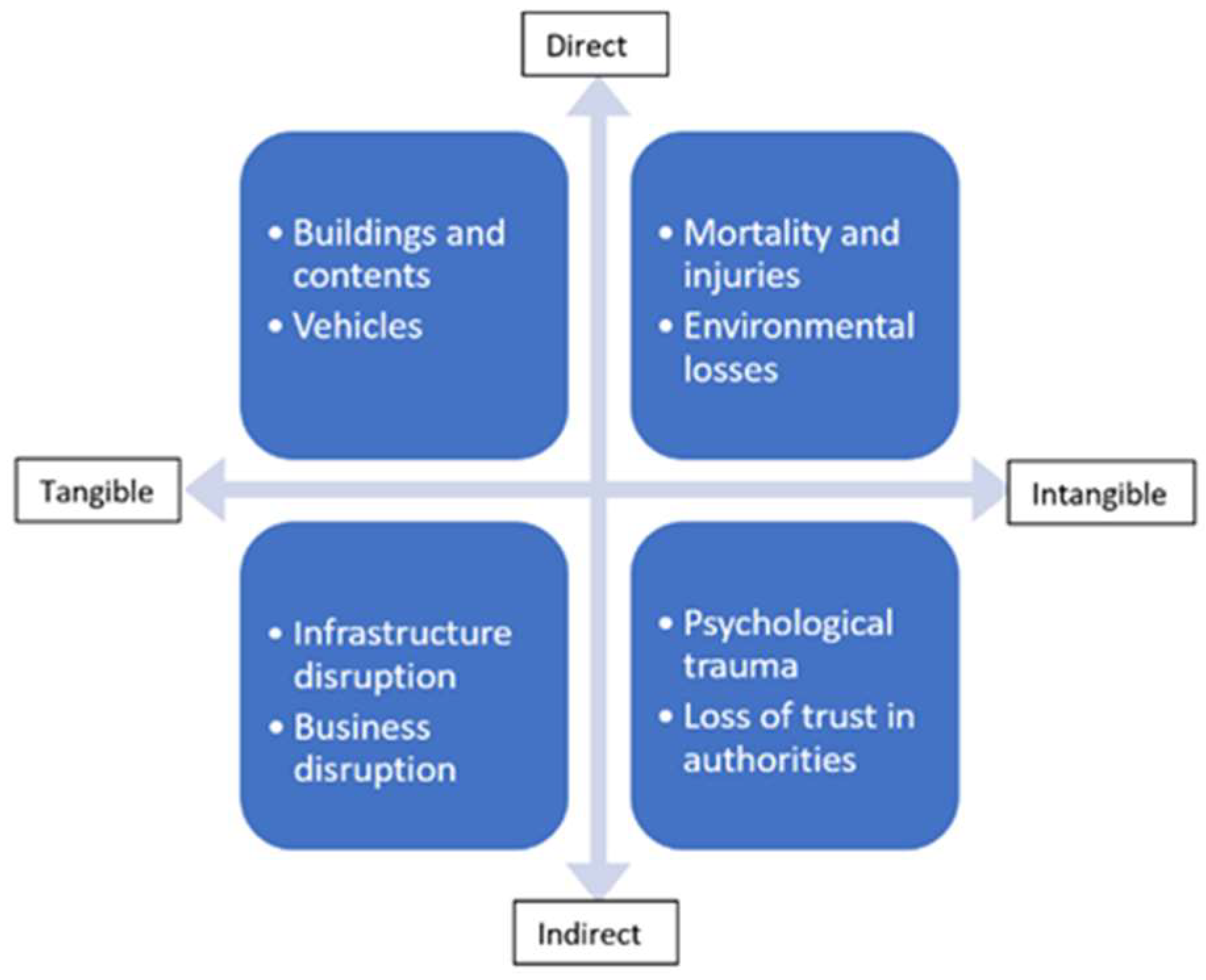
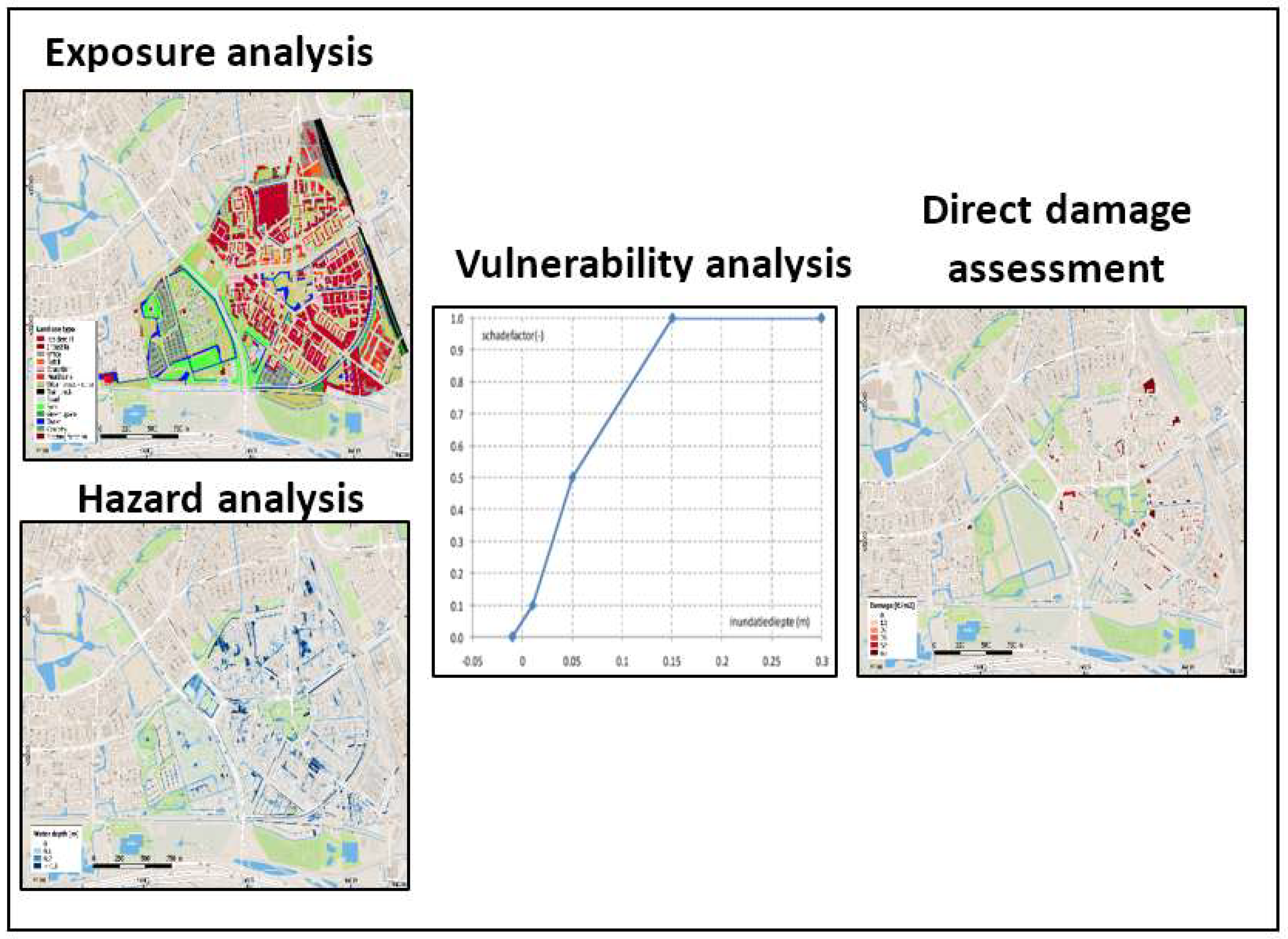
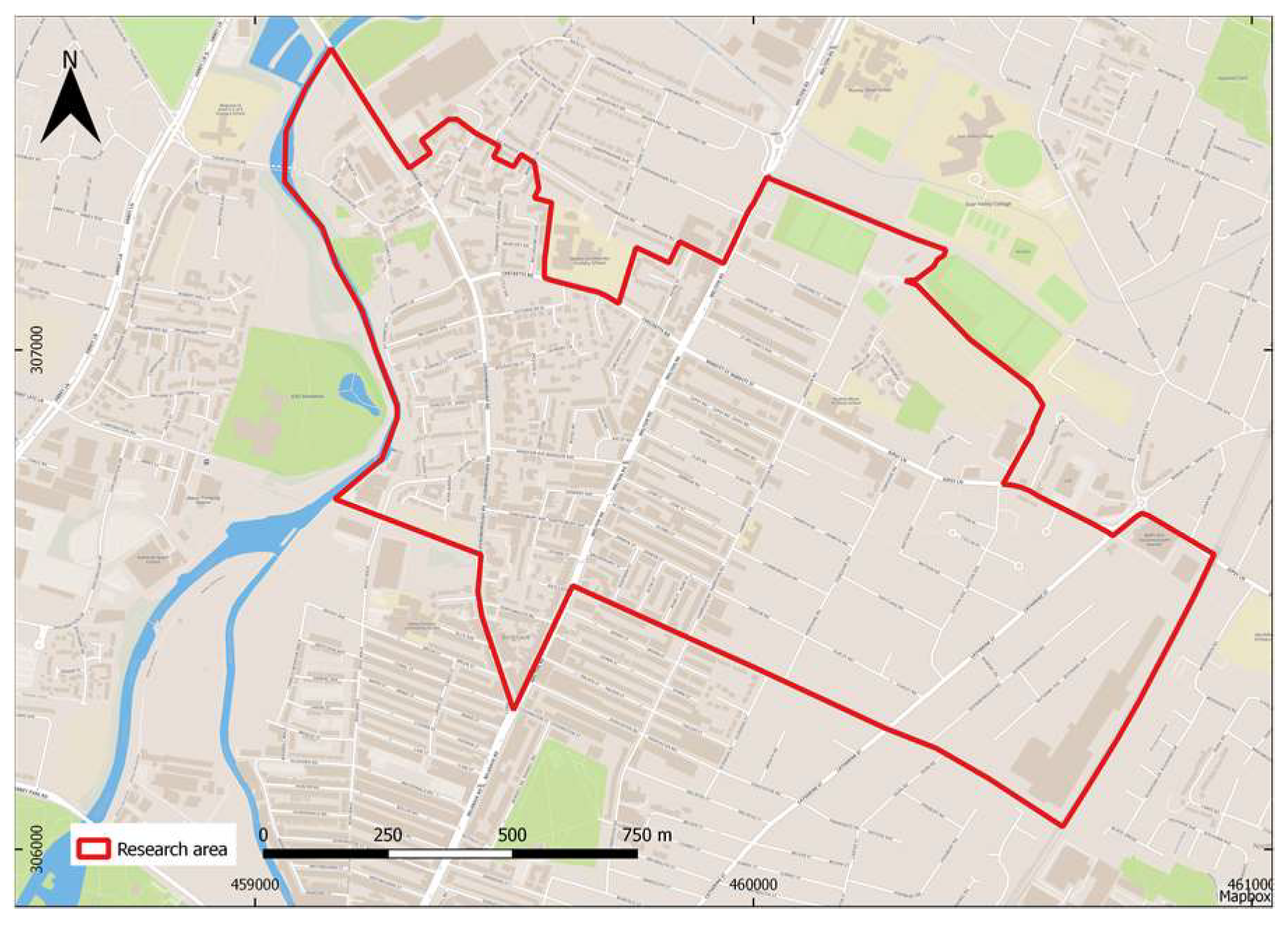
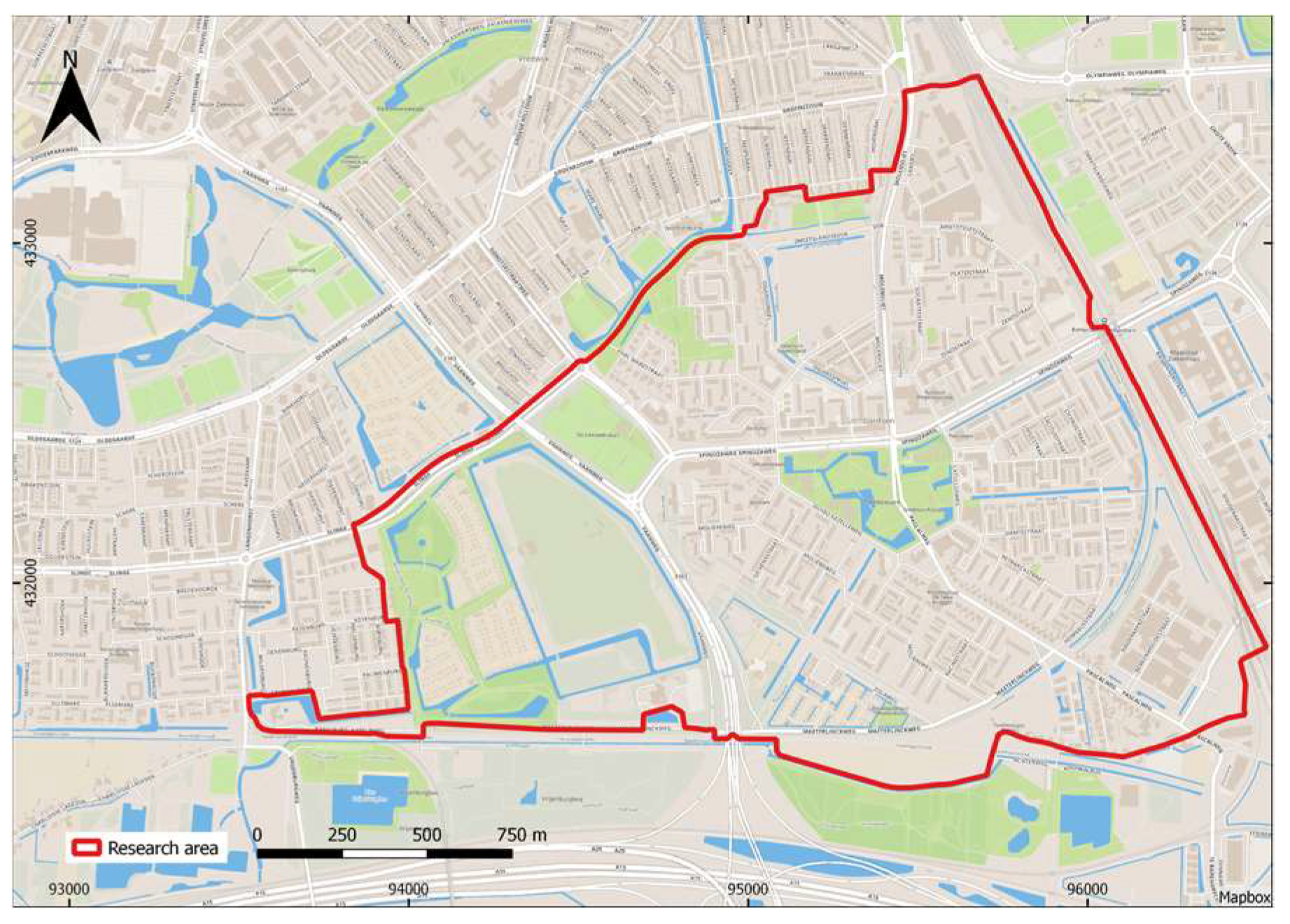
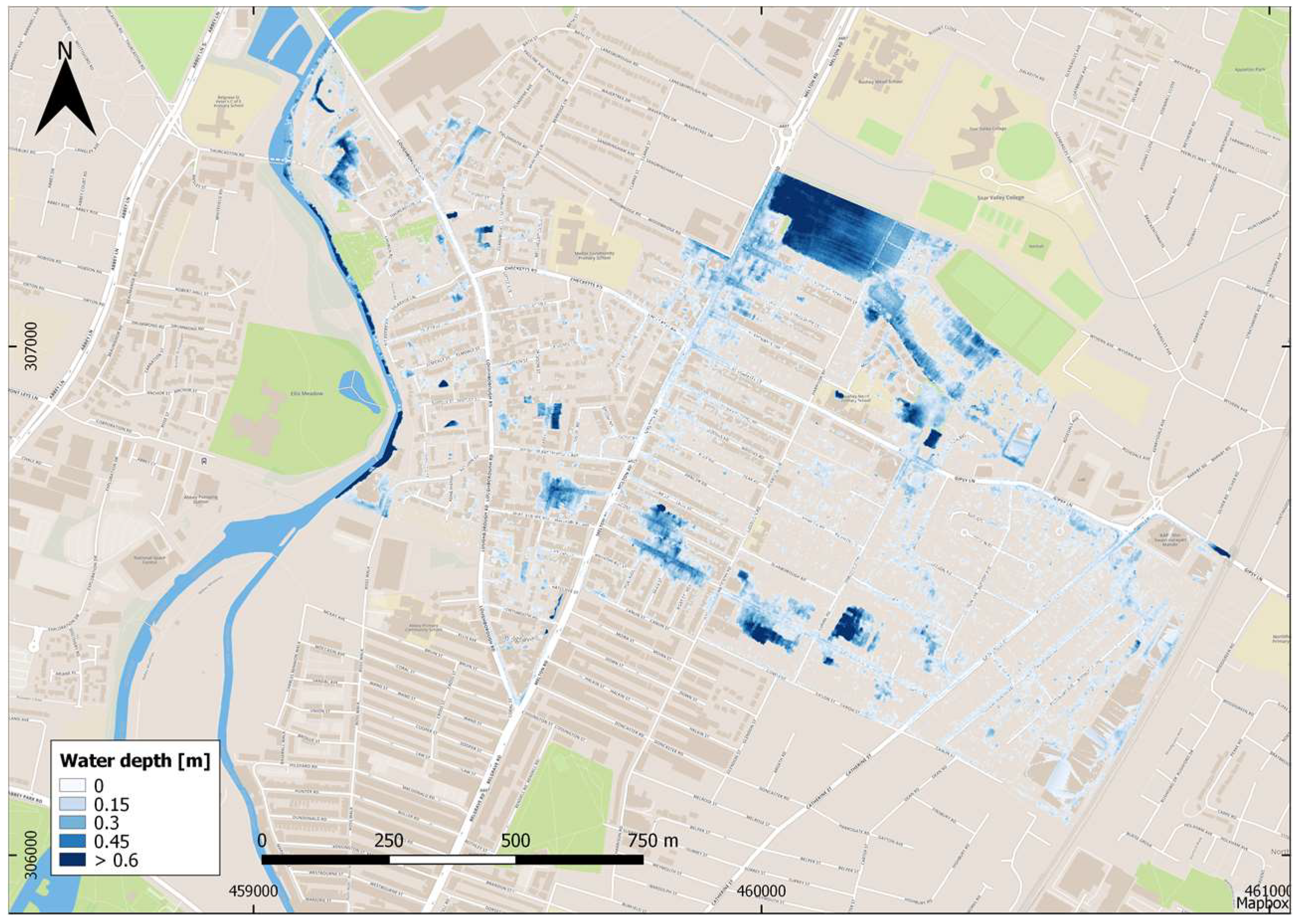
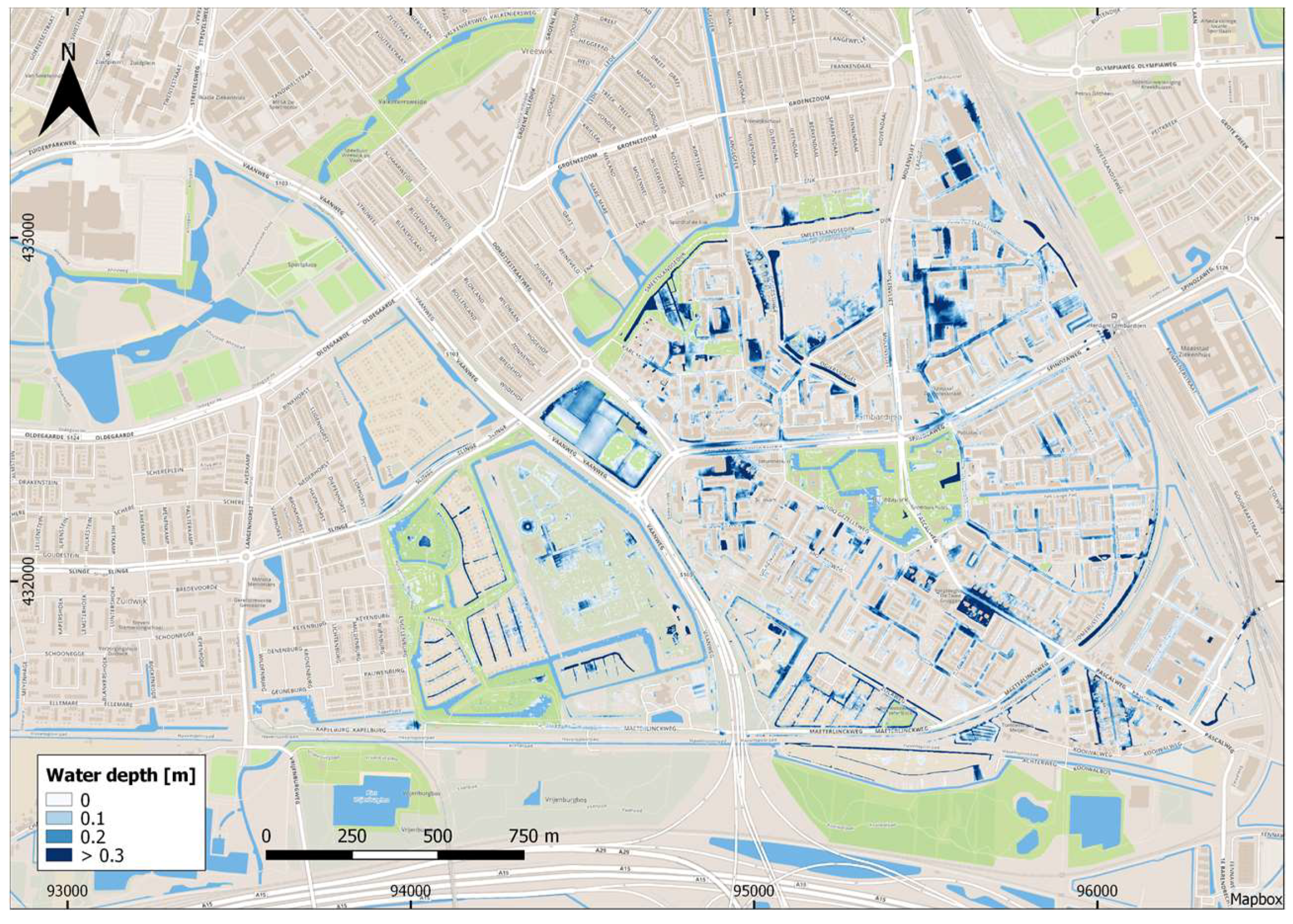
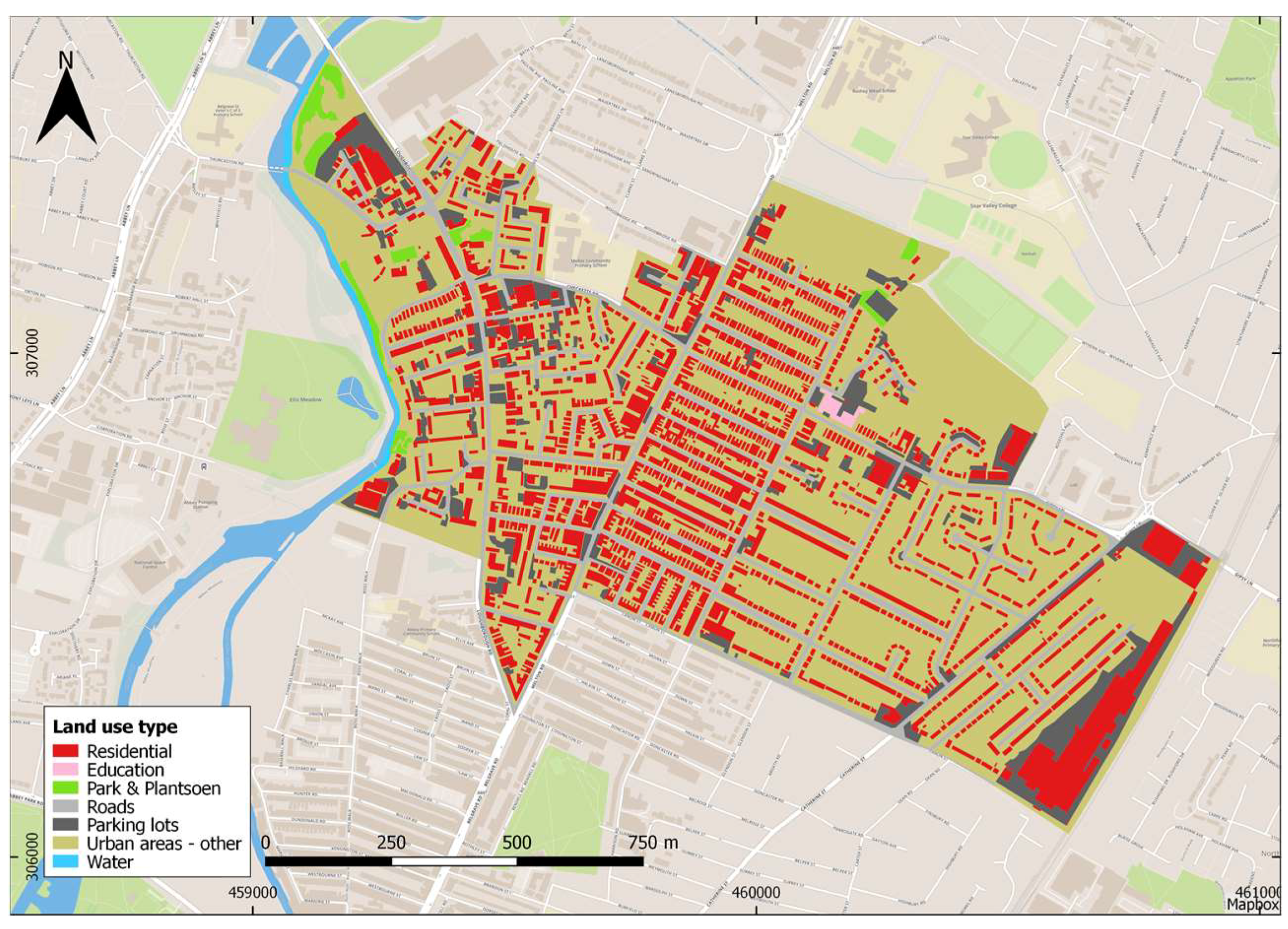
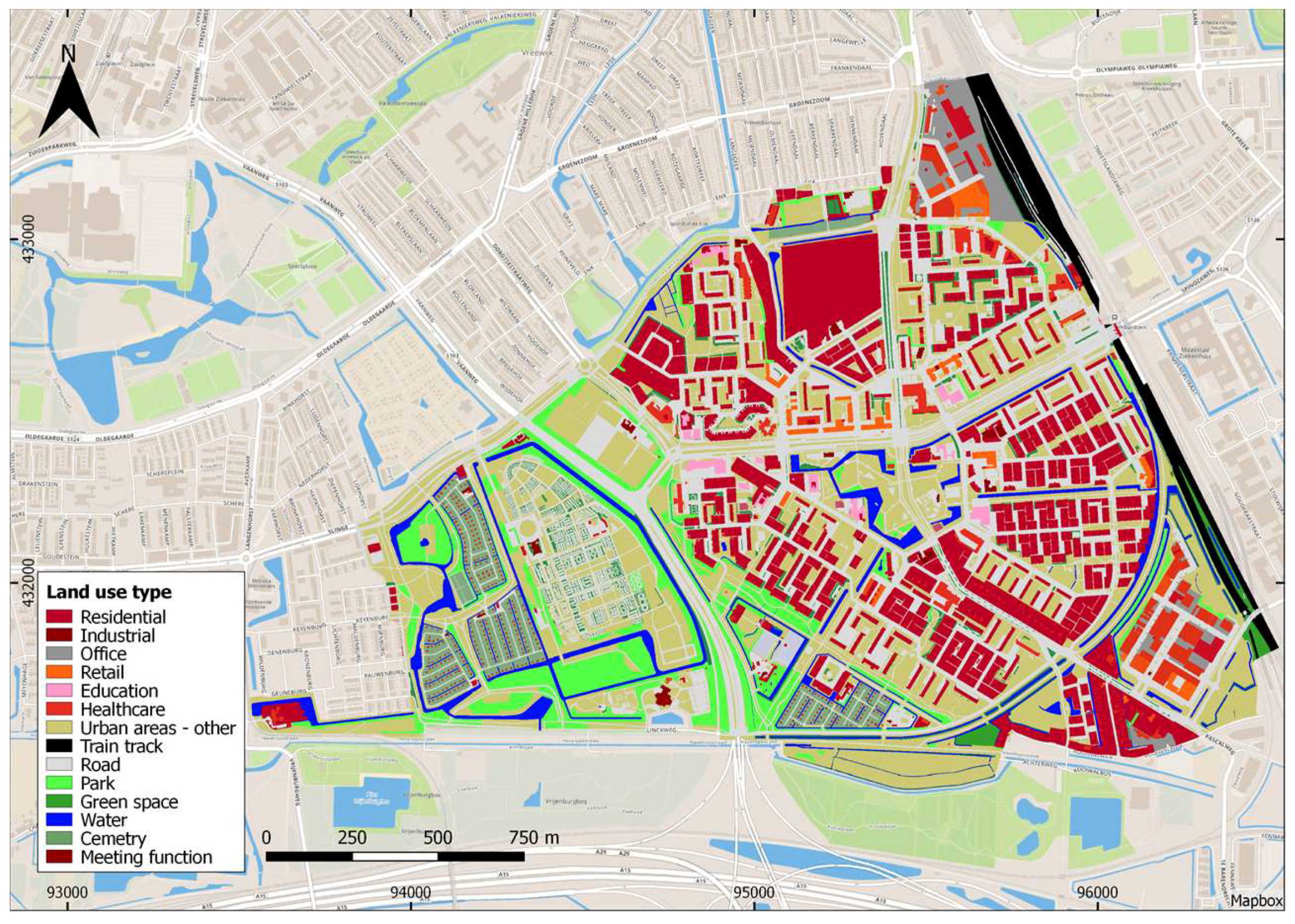
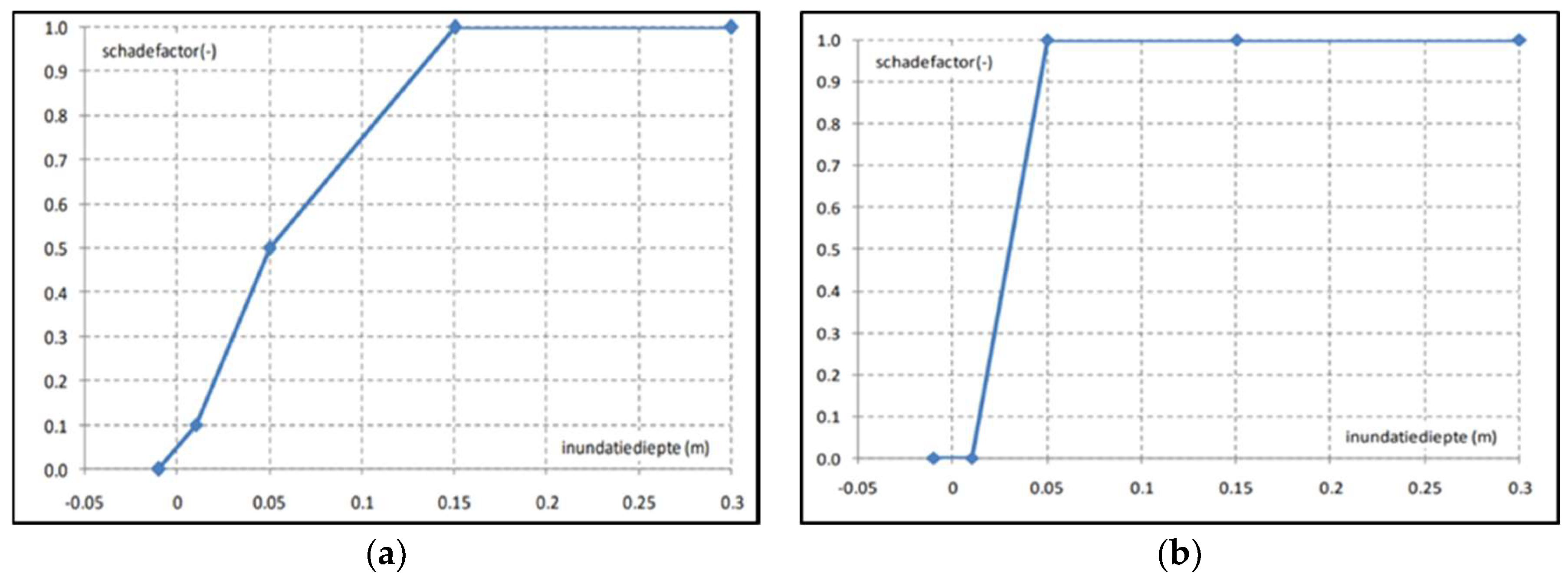

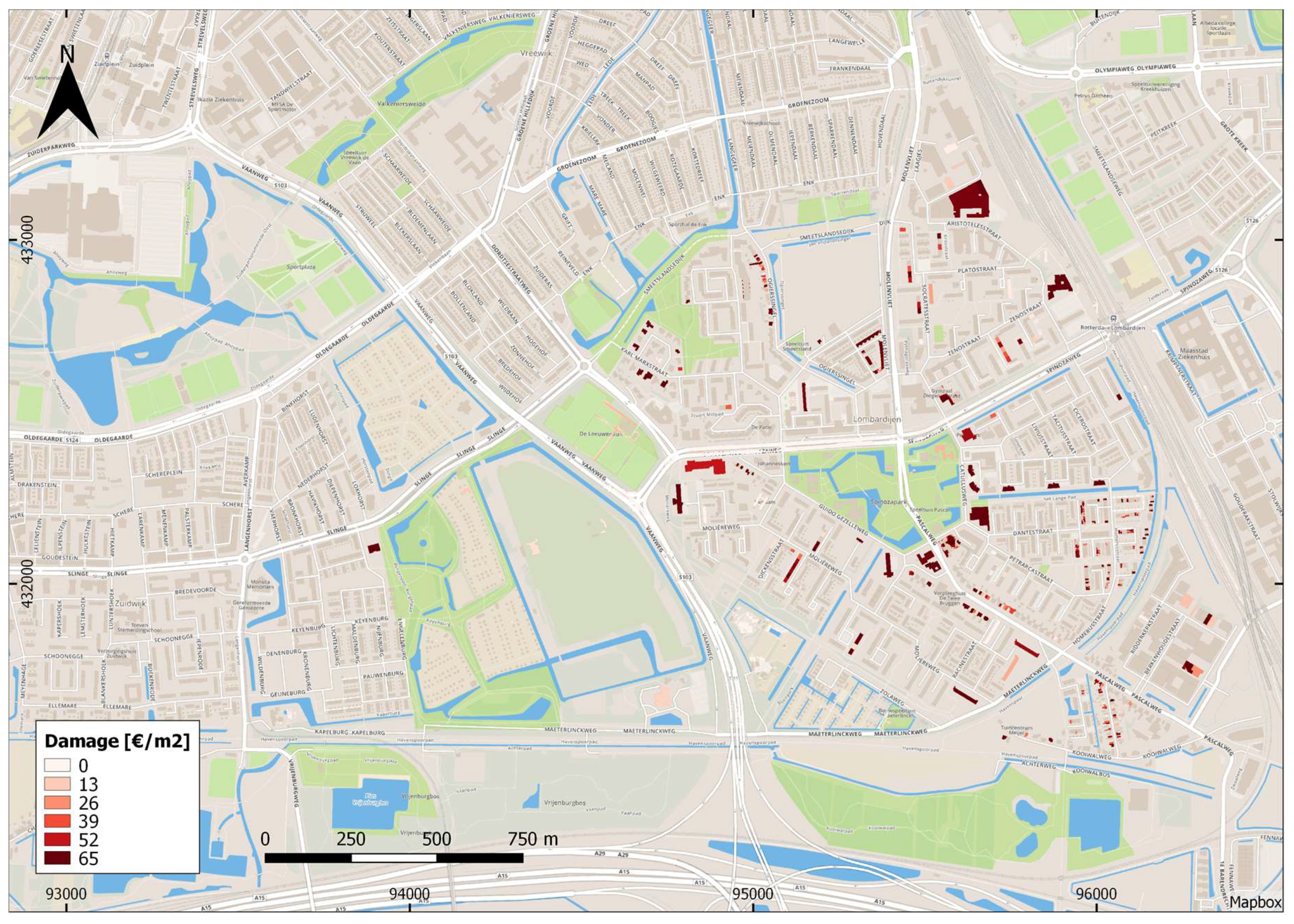
| Land Use Type | Average Damage (€/m2) |
|---|---|
| Residential | 271 |
| Educational | 271 |
| Parks & greens | 0.1086 |
| Roads | 0.076 |
| Parking lots | 0.076 |
| Urban areas-other | 0 |
| Water | 0 |
| Land Use Type | Average Damage (€/m2) |
|---|---|
| Residential | 271 |
| Industrial | 271 |
| Office | 271 |
| Retail | 271 |
| Educational | 271 |
| Healthcare | 271 |
| Meeting | 271 |
| Sport | 54 |
| Parks & greens | 0.1086 |
| Train track | 0.076 |
| Roads | 0.076 |
| Urban areas–other | 0 |
| Cemetery | 0 |
| Water | 0 |
| Damage Type | Damage (€) |
|---|---|
| Residential | 10,895,788 |
| Educational | 87,912 |
| Roads | 2833 |
| Parking lot | 2717 |
| Parks & greens | 473 |
| Water | 0 |
| Urban areas-other | 0 |
| Total | 10,989,723 |
| Damage Type | Damage (€) |
|---|---|
| Residential | 7,558,742 |
| Industrial | 2,283,720 |
| Meeting | 1,224,713 |
| Educational | 672,239 |
| Office | 487,369 |
| Sport | 137,291 |
| Retail | 13,025 |
| Roads | 645 |
| Train track | 220 |
| Parks & greens | 135 |
| Healthcare | 0 |
| Urban areas-other | 0 |
| Total | 12,378,099 |
© 2019 by the authors. Licensee MDPI, Basel, Switzerland. This article is an open access article distributed under the terms and conditions of the Creative Commons Attribution (CC BY) license (http://creativecommons.org/licenses/by/4.0/).
Share and Cite
Nicklin, H.; Leicher, A.M.; Dieperink, C.; Van Leeuwen, K. Understanding the Costs of Inaction–An Assessment of Pluvial Flood Damages in Two European Cities. Water 2019, 11, 801. https://doi.org/10.3390/w11040801
Nicklin H, Leicher AM, Dieperink C, Van Leeuwen K. Understanding the Costs of Inaction–An Assessment of Pluvial Flood Damages in Two European Cities. Water. 2019; 11(4):801. https://doi.org/10.3390/w11040801
Chicago/Turabian StyleNicklin, Harry, Anne Margot Leicher, Carel Dieperink, and Kees Van Leeuwen. 2019. "Understanding the Costs of Inaction–An Assessment of Pluvial Flood Damages in Two European Cities" Water 11, no. 4: 801. https://doi.org/10.3390/w11040801
APA StyleNicklin, H., Leicher, A. M., Dieperink, C., & Van Leeuwen, K. (2019). Understanding the Costs of Inaction–An Assessment of Pluvial Flood Damages in Two European Cities. Water, 11(4), 801. https://doi.org/10.3390/w11040801




_van_Van_Leeuwen.png)

